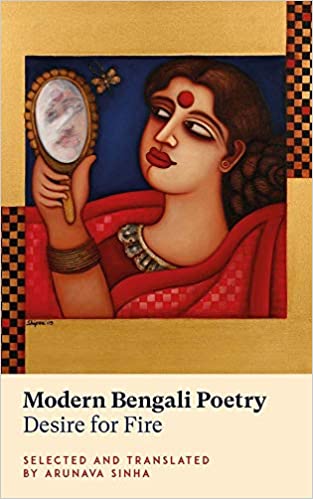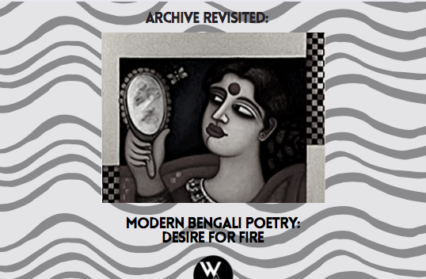We look back Natalie Ann Holborow’s review of Modern Bengali Poetry: Desire for Fire, a collection of Bengali poetry celebrating over one hundred years from the two Bengals -the eastern Indian state and the country of Bangladesh, with poems in a variety of styles and forms.
2022 marks ten years since the launch of Wales Arts Review, and as part of our celebrations, throughout this year we’ll be revisiting some of the best and most loved features, interviews, and reviews from our archive of nearly five thousand published pieces.
*
Poetry occupies a special space in Bengali literature. The seventh most spoken language in the world, Bengali has an impressive range of poetic form and style: from the lyrical to the political, from the romantic to the experimental.
 Before being asked to review this translated volume of what can be defined as ‘modern’ Bengali poetry (although the translator Arunava Sinha notes that this term is “perhaps the most discussed, critiqued and controversial appellation” in its history), I asked fellow writers in both the eastern Indian state and Bangladesh to recommend their favourite poets so I could get an initial taste of some of the biggest names in Bengali literature. What struck me in doing so was that the vast majority of writers, from both younger and older generations, each provided a wide-ranging list, yet the overall majority cited Rabarindrinath Tagore in their recommendations – no trivial feat for a late 19th and early 20th century poet to have such enduring appeal and influence across all age ranges.
Before being asked to review this translated volume of what can be defined as ‘modern’ Bengali poetry (although the translator Arunava Sinha notes that this term is “perhaps the most discussed, critiqued and controversial appellation” in its history), I asked fellow writers in both the eastern Indian state and Bangladesh to recommend their favourite poets so I could get an initial taste of some of the biggest names in Bengali literature. What struck me in doing so was that the vast majority of writers, from both younger and older generations, each provided a wide-ranging list, yet the overall majority cited Rabarindrinath Tagore in their recommendations – no trivial feat for a late 19th and early 20th century poet to have such enduring appeal and influence across all age ranges.
Modern Bengali Poetry: Desire for Fire celebrates over one hundred years of poetry from the two Bengals, starting with the later poems of Tagore and celebrating over one hundred years of poetry by over fifty poets in a multitude of forms and styles. It explores the initial influence of Tagore, the revolutionary need to break free during the period between the two world wars and returns full circle to consider his legacy in the Bengali writing of today. The book’s introduction is a thing of considered depth considering its modest length, providing a good overview of the complex and mercurial landscape of modern Bengali poetry.
Before I focus on a selection of the poems themselves, perhaps it is worth noting here that the skill of adept literary translation is one eminently worthy of accolade. As the Bengali writer and translator Ketaki Kushari Dyson so diligently expressed in her talk, Translation: The Magical Bridge Between Cultures for the Comparative Literature Association of India, without translation “we would be imprisoned in a monocultural world, knowing neither our own ancient heritage, nor the heritage, ancient or modern, of other cultures near or far.” She goes on to add, “The rich diversity of this human community cannot be appreciated or even understood without the essential tool of translation.”
Credit is therefore due here to Sinha, who has managed to capture a diverse selection of voices, rhythms, idioms and styles in a way which allows every poem to breathe; to mark itself out as distinctive without diluting the imagery with over-literal translation nor to give way over-embellishment. Each poem is considered in its own right, and this is no doubt testament to the fact that he has translated an impressive catalogue of Bengali literary texts spanning both fiction and poetry.
Tagore’s ‘Camellia’ (a personal favourite prior to reading the book) serves well as the book’s opening poem, demonstrating an almost prosaically written sense of spiritual didacticism. In the poem, the luxurious bloom serves both a role in the story’s narrative and concurrently exists as an apt symbol of his growing adoration for Kamala, the subject of the narrator’s affection:
Before the sun was overhead
While the dew-soaked breeze blew
She strolled in the sal wood with her parasol
The wild flowers bowed in prayer at her feet
She didn’t even spare them a glance.
Following in Tagore’s vein and introduced as “the finest Bengali poet to follow Tagore”, Jibanananda Das was a poet enamoured with the allure of the natural world. His poem ‘Bonalata Sen’ was one that is particularly striking in its use of metaphor and unique lyricism; from the hawk that “wipes the sun-smell off its wings” to the “green land in a cinnamon isle”, ending stunningly with the image of the manuscript that “twinkles in firefly hues for all these tales / All birds come home – all streams.”
So many of the poems in this volume are a sublime feast for the senses; as much as walking through the steamy haze of Indian rain was for me a few years ago. I am swept up again into the cacophony of Kolkata by Purnendu Pattrea’s ‘Conversations’ with its “softly overcast Calcutta skies / The knee-deep water on Calcutta’s pavements, submerged / carts…”
In contrast, there’s the urgent, charged language of Shakti Chattopadhyay’s ‘The Rain On Calcutta’s Breast’, with its “rain, like galloping hooves rang out on the tin shed, flowers were sprinkled on the road / A stain trickled down the garbage hillock” which darkens thereon to the austere vision of “The labour room on one side, crematorium ashes on the other.” A poet of the Krittibas school of the 1950s and 1960’s, the translator reminds us that not even the ‘apolitical’ Chattopadhyay could turn away from the “disappointment and despair of unmet expectations” during a time of enormous social and political changes in Bengal.
The rallying cries of political poets in the volume is significant, with writers such as Mallika Sengupta (often described as an “unapologetically political” poet), fiercely challenging the patriarchal nature of history in poetry. A feminist by her ideological postulation, she writes in ‘While Teaching My Son History’: “The forefathers were alone, mankind too / We have no womankind, nor foremothers / History is his story of sperm and valour.” However, I personally believe her standout work within this volume is ‘Salt’, with its unsettling and direct use of language that remained with me for the rest of the day:
Anguished midwives in Bihar’s villages
Stuff balls of salt into newborn girls’ throats
And close their mouths, for twenty-five rupees.
Moving towards the contemporary poets, Anita Agnihotri’s chronicling of the lives of people on the margins is demonstrated through sharp, unflinching observation:
…the hair at her temples
Is greying, like the winter sunlight the mother’s youth
Dwindles in the wind, the girl who crawls today
Will go to school.
I do not want to end this review without mention of Srijato, who is described as “the best among contemporary poets” and certainly one whom Bengali writers of the younger generation whose work they had indeed recommended I seek out. His language, rhythm and structure is deemed experimental; I found myself delighted by cleverly-constructed lines such as “The crockery is happily floating about and among them my mother / floats too, her head on my father’s shoulder…” in ‘My Parents and I’. Within the same poem, his wide-ranging skill is exemplified in pleasantly surprising twists, such as the scintillating ability to interlace heavier themes with his sparkling wit. In one section, interspersed between an emotionally-charged depiction of a familial rift, he metamorphosises his parents into scrapping felines:
bicker over fish curry and milk packets
Hurling ever louder yowls at each other
Even taking swipes with their paws
How long can one stand this? I’m tempted
To take them by the scruffs of their necks
Abandon them somewhere, that’ll teach them.
Arunava Sinha puts it perfectly in the conclusion to his introduction: “It could be argued that the constant change in the landscape of Bengali poetry signifies the very flow of life.” Because this, in essence, is what poetry is. It’s life distilled into language, as unique and ever-changing as we are.
Modern Bengali Poetry: Desire for Fire is a collection that blazes with an impressive chorus of poetic voices and leaves the words burning in the mind long after the last page curls in its glow.
Natalie Ann Holborow is the Swansea based multiple award-winning author of And Suddenly you Find Yourself (2017) and Small (2020). She is also a full-time content specialist in the education and learning & development industries as well as editor of the prestigious Terry Hetherington Award anthology.
Natalie Ann Holborow’s “Modern Bengali Poetry: Desire for Fire” was originally published by Wales Arts Review in 2020.












